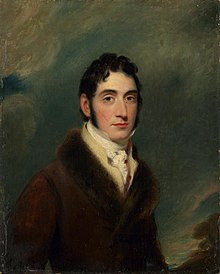William Lyttelton, 3rd Baron Lyttelton
|
The Right Honourable The Lord Lyttelton |
|
|---|---|

A c. 1849 oil on millboard portrait of Lord Lyttelton by an unknown artist in the collection of the National Library of Australia
|
|
| Member of Parliament for Worcestershire | |
|
In office 1806 – 1820 Serving with Hon. William Beauchamp Lygon |
|
| Personal details | |
| Born | 3 April 1782 |
| Died | 30 April 1837 (aged 55) Green Park, London, England, UK |
| Nationality | United Kingdom |
| Political party | Whig |
| Spouse(s) | Lady Sarah Spencer |
| Education | Rugby School |
| Alma mater | Christ Church, Oxford |
| Profession | Politician |
| Religion | Anglicanism |
| Signature | |
|
|
|
William Henry Lyttelton, 3rd Baron Lyttelton (3 April 1782 – 30 April 1837) was an English Whig politician from the Lyttelton family.
Born on 3 April 1782, William Lyttelton was the son of William Henry Lyttelton, 1st Baron Lyttelton, by his second marriage to Caroline, daughter of John Bristow of Quiddenham, Norfolk. He was educated at Rugby School, then matriculated at Christ Church, Oxford, on 24 October 1798 and graduated with a Bachelor of Arts (B.A.) on 17 June 1802 and a Master of Arts (M.A.) on 13 December 1805. A student from December 1800 until 1812 and a brilliant scholar of Greek, on 5 July 1810 he was created a Doctor of Civil Law (D.C.L.) on the occasion of Lord Grenville's installation as Chancellor of the University of Oxford.
Lyttelton unsuccessfully contested Worcestershire in March 1806, but was returned in the following year, and represented the county until 1820 for the Whig party. His maiden speech was made on 27 February 1807 in favour of the rejection of the Westminster petition; and on 16 March he brought forward a motion (rejected by 46 votes) expressing regret at the substitution of the Duke of Portland's administration for Lord Grenville's. He attacked the new ministers, especially Spencer Perceval, for bigotry. He supported the naval expedition to Copenhagen in opposition to the bulk of his party, but voted with them on the motion of Samuel Whitbread for the production of papers relative to it.
...
Wikipedia
